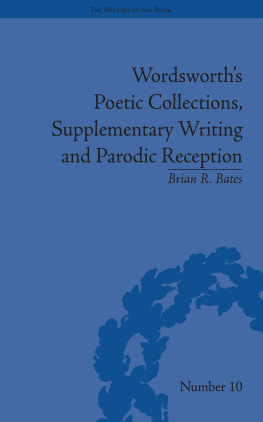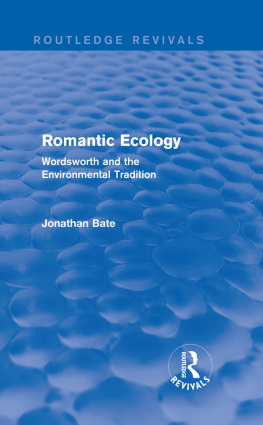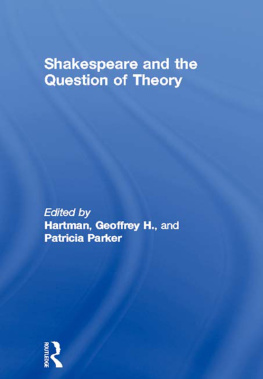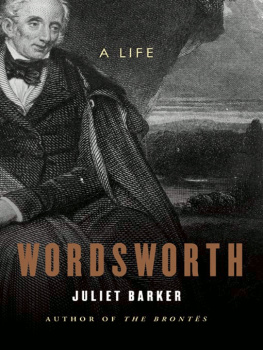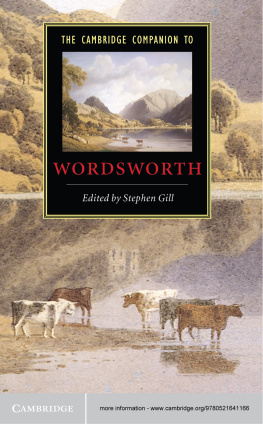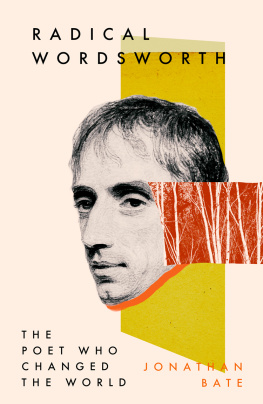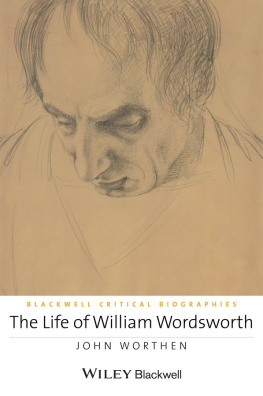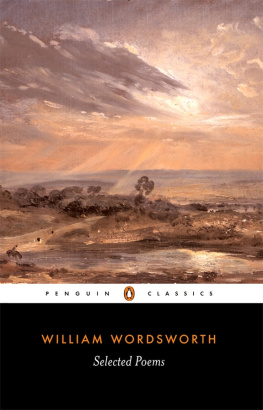Wordsworth William - Wordsworths poetry, 1787-1814 : [with the essay Retrospect 1971]
Here you can read online Wordsworth William - Wordsworths poetry, 1787-1814 : [with the essay Retrospect 1971] full text of the book (entire story) in english for free. Download pdf and epub, get meaning, cover and reviews about this ebook. City: New Haven, year: 1971, publisher: Yale University Press, genre: Science. Description of the work, (preface) as well as reviews are available. Best literature library LitArk.com created for fans of good reading and offers a wide selection of genres:
Romance novel
Science fiction
Adventure
Detective
Science
History
Home and family
Prose
Art
Politics
Computer
Non-fiction
Religion
Business
Children
Humor
Choose a favorite category and find really read worthwhile books. Enjoy immersion in the world of imagination, feel the emotions of the characters or learn something new for yourself, make an fascinating discovery.

- Book:Wordsworths poetry, 1787-1814 : [with the essay Retrospect 1971]
- Author:
- Publisher:Yale University Press
- Genre:
- Year:1971
- City:New Haven
- Rating:3 / 5
- Favourites:Add to favourites
- Your mark:
- 60
- 1
- 2
- 3
- 4
- 5
Wordsworths poetry, 1787-1814 : [with the essay Retrospect 1971]: summary, description and annotation
We offer to read an annotation, description, summary or preface (depends on what the author of the book "Wordsworths poetry, 1787-1814 : [with the essay Retrospect 1971]" wrote himself). If you haven't found the necessary information about the book — write in the comments, we will try to find it.
Wordsworths poetry, 1787-1814 : [with the essay Retrospect 1971] — read online for free the complete book (whole text) full work
Below is the text of the book, divided by pages. System saving the place of the last page read, allows you to conveniently read the book "Wordsworths poetry, 1787-1814 : [with the essay Retrospect 1971]" online for free, without having to search again every time where you left off. Put a bookmark, and you can go to the page where you finished reading at any time.
Font size:
Interval:
Bookmark:
WORDSWORTHS POETRY
17871814

17871814
BY GEOFFREY H. HARTMAN

Copyright1964 and 1971 by Yale University.
Fourth printing, 1971, with a new essay Retrospect 1971.
All rights reserved. This book may not be
reproduced, in whole or in part, in any form
(except by reviewers for the public press),
without written permission from the publishers.
Library of Congress catalog card number: 6420920
ISBN: 0300005385 (cloth), 0300001088 (paper)
Designed by John O. C. McCrillis
and set in Linotype Baskerville type.
Printed in the United States of America by
The Carl Purington Rollins Printing-Office of the
Yale University Press.
Distributed in Great Britain, Europe, and Africa by
Yale University Press, Ltd., London; in Canada by
McGill-Queens University Press, Montreal; in Latin America by Kaiman
& Polon, Inc., New York City; in Australasia by
Australia and New Zealand Book Co., Pty., Ltd.,
Artarmon, New South Wales; in India by UBS Publishers
Distributors Pvt., Ltd., Delhi; in Japan by John
Weatherhill, Inc., Tokyo.
In memoriam
ERICH AUERBACH
And he said, Go forth, and stand upon the
mount before the Lord. And, behold, the Lord
passed by, and a great and strong wind rent
the mountains, and brake in pieces the rocks
before the Lord; but the Lord was not in the
wind: and after the wind an earthquake; but
the Lord was not in the earthquake: And
after the earthquake a fire; but the Lord was
not in the fire: and after the fire a still
small voice.
I KINGS 19:1112
It is seven years since this book appeared; and as books have their own fate, this one too has been interpreted in ways its author could not foresee. There have been many generous comments, also some misunderstandings. One critic, quite upset, reduced the book to the interesting if bloody-minded argument that Wordsworth needed to kill or violate nature in order to achieve his moments of visionary poetry. I must admit that poetry can exact a price, but I would not put it so high. Indeed, I thought my book had argued almost the reverse: that Wordsworth, deeply wary of visionary poetry of Miltons kind, foresaw a new type of consciousness, satisfied with nature, or at least not obliged to violate it in imagination. Wordsworth was haunted, certainly, by the fear that coming-to-consciousness was connected with the sense of violation or trespass: so Oswald, in The Borderers, raises the consciousness of Marma-duke by having him commit a murder. Yet the poets utopian or saner view is that we do not have to pay a blood price for consciousness. A similar confusion underlies the argument that I was too preoccupied with self-consciousness to give much thought to the creative or social aspects of imagination. Yet the difficult humanizing of imagination is what I chiefly followed in Wordsworth. I would not have needed to follow it if it were not a problem. Just as the first critic had little appreciation of dialectical thinking, so the second saw the counterbalanced and ideal vision rather than the labor necessary to achieve it.
I could discuss other misunderstandings but that might become an exercise in self-justification. I hope, however, that a brief summary of the books central purposes will be helpful to old as well as new readers. It will also allow me to restate some of my themes in terms which reflect what has interested me since the completion of this study.
What I did, basically, was to describe Wordsworths consciousness of consciousness. Everything elsepsychology, epistemology, religious ideas, politicswas subordinated. If that is phenomenological procedure, so be it. I did not, however, support any special (Hegelian, Jungian, etc.) theory of personal identity or human and historical development. Though sometimes adducing analogies from other writers, I tried to describe things strictly as they appeared to the poet, while raising the question as to why he so carefully respected their modes of appearance. The answer given by Wordsworth was that he had made when young a providential error: then it was already consciousness that was appearing, not simply things; and the blindness which caused the growing spirit to feel not its own burden but that of natural objects (they lay upon his mind like substances and perplexed the bodily sense) initiated a quest-romance in pursuit of the creation, one which gave the boys imagination time to naturalize itself, to direct its great but uncertain powers toward the things of this world.
In short, I followed Wordsworths self-interpretations as closely as possible. I saw him trace certain sensory fixations, especially an obsession with place. Haunted by the idea of a secret or sacred spot on which nature seemed to converge, he rediscovered the religious (and romance) motif of numinous places. My analysis of how, and with what difficulty, Wordsworths spirit detached itself from place and raised itself to the larger, more generous idea of nature showed that the notion of spots of time was still indebted to that of spirit of place. Poetic genius, in Wordsworth, never quite freed itself of the genius loci, and in attempting to respect these nature-involved epiphanies, he relived on the very ground of his senses the religious struggle between Hellenic (fixed and definite) and Hebraic (indefinite, anti-anthropomorphic) representations of the divine.
This, too, was one of the few occasions when terms from outside poetry seemed useful. I called the haunting-and-haunted spot an omphalos (after Mircea Eliades studies of myth) and the movement of the mind toward it centroversion (after Jungs studies of the process of individuation). Other terms could have been suggested: the power-place, though in nature (or at least sub specie naturae), could have been associated with Freuds primal scene. I did not want to overdefine, however, and for the same reason, later in the book, did not develop the implications of calling the contrary of apocalypse an akedah, after the binding of Isaac by Abraham in Genesis 22.
The poets development, I argued, was essentially a matter of converting apocalypse into akedah, or binding to nature, as a preparatory humanizing, an otherworldly power of imagination. Otherworldly, in that the imagination tended to seek a separate reality and that the everyday world was often so inadequate that the imagination preferred withdrawal or ecstasy: the illusion of a life beyond life. Wordsworth rarely expressed this flight in visionary terms because vision was a symptom of the disease he wanted to cure. The difficulty of adjusting his reality-hunger to realitya hunger which could paradoxically turn into an appetite for death is pursued in its many changeable forms as an important, even intrinsic factor in the growth of the individual mind. Nature, fearful and beautiful, succeeds at first in attaching the childs thoughts to itself and becomes a foster home to this alien from the sphere of celestial light. But as he grows aware of what is within and separates imagination more clearly from nature (redeeming his emanation, Blake would say) the child passes from unselfconsciousness to selfconsciousness and faces all the dangers of that complex passage. He realizes both his inner strength and his vulnerability: he fears isolation yet rejoices in autonomy. In retrospect, nature is seen to have played an essential though self-transcending role in the growth of the mind. It drew the poets fantasies toward life yet left them room; it gave him the basis for his faith that imagination was an excursive power able to find satisfaction in man as it had in nature.
Next pageFont size:
Interval:
Bookmark:
Similar books «Wordsworths poetry, 1787-1814 : [with the essay Retrospect 1971]»
Look at similar books to Wordsworths poetry, 1787-1814 : [with the essay Retrospect 1971]. We have selected literature similar in name and meaning in the hope of providing readers with more options to find new, interesting, not yet read works.
Discussion, reviews of the book Wordsworths poetry, 1787-1814 : [with the essay Retrospect 1971] and just readers' own opinions. Leave your comments, write what you think about the work, its meaning or the main characters. Specify what exactly you liked and what you didn't like, and why you think so.

